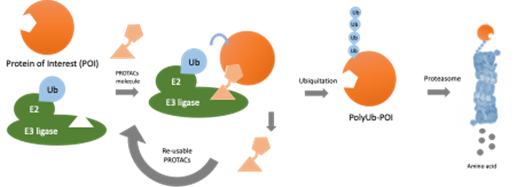โครงการการค้นหาและประเมินศักยภาพของเอนไซม์ไลเกสชนิด E3 ของเชื้อมาลาเรียเพื่อใช้ในเทคโนโลยีฐาน PROTAC (Identification and Validation of Potential Plasmodium E3 Ligases for PROTAC Platform) โดย ดร.นิติพล ศรีมงคลพิทักษ์ ทีมวิจัยการออกแบบและวิศวกรรมชีวโมเลกุลขั้นแนวหน้า ศูนย์พันธุวิศวกรรมและเทคโนโลยีชีวภาพแห่งชาติ (ไบโอเทค) สวทช. ร่วมกับ FIMECS, Inc. ประเทศญี่ปุ่นได้รับคัดเลือกสนับสนุนทุนวิจัยจำนวน 27,471,017 บาท (USD 838,587) จาก The Global Health Innovative Technology Fund
ข้อมูลขององค์กรอนามัยโลกเปิดเผยว่าในปัจจุบันมีผู้ป่วยจากโรคมาลาเรียทั่วโลกมากกว่า 200 ล้านคนต่อปีและมีผู้เสียชีวิตปีละประมาณ 400,000 คน การรักษาโรคมาลาเรียที่ผ่านมาสามารถทำได้อย่างมีประสิทธิภาพโดยการใช้ยาต้านมาลาเรีย แต่ในปัจจุบันปรสิตที่ทำให้เกิดมาลาเรียพัฒนาตนเองจนต้านยารักษาได้สำเร็จ หากไม่มีการคิดค้นเป้าหมายยาและยาชนิดใหม่อย่างเร่งด่วนมีการคาดการณ์ว่าภายในปี 2050 จะมีผู้เสียชีวิตจากทั่วโลกหลายล้านคน
PROteolysis-TArgeting Chimeras (PROTACs) เป็นโมเลกุลยาขนาดเล็กรูปแบบใหม่ที่สามารถย่อยสลายโปรตีนเป้าหมายผ่านกลไก ubiquitin/proteasome ภายในเซลล์ เนื่องจาก PROTACs ย่อยสลายโปรตีนจึงมีศักยภาพในการรักษาอาการของโรค การใช้ PROTAC เป็นยาเป็นกระบวนทัศน์ใหม่ในการออกแบบยาที่สามารถมุ่งเป้าไปที่เป้าหมายยาได้หลากหลาย แม้กระทั้งเป้าหมายเก่าที่สามาถใช้เป็นเป้าหมายยาได้มาก่อน PROTACs ทำงานโดยการเชื่อมต่อ E3 ubiquitin ligase กับโปรตีน E3 ligase โดยสามารถเข้าย่อยสลายโปรตีนเป้าหมายโดยการทำให้โปรตีโซม (proteosome) แตกตัว ปัจจุบันมีการพัฒนาการใช้ PROTAC ในการพัฒนายาต้านมะเร็งในระดับคลินิก แต่ยังไม่มีการประยุกต์ใช้ PROTAC ในโรคติดเชื้อมาก่อน
เนื่องจากในเชื้อมาลาเรียมีกลไกของ ubiquitin/proteasome เช่นเดียวกับโรคไม่ติดต่อ แต่ในปัจจุบันกลไกนี้ยังไม่มีการศึกษามากนัก ดร.นิติพลและทีมจึงประยุกต์ใช้เทคนิคทางเคมีและพันธุศาสตร์ในการค้นหาและตรวจสอบเอนไซม์ E3 ligase และลิแกนด์ของ E3 ligase ที่สามารถย่อยสลายโปรตีนเป้าหมายของเชื้อมาลาเรีย โดยองค์ความรู้ที่ได้จากโครงการจะสามารถใช้เป็นแพลตฟอร์มสำหรับการพัฒนายาต้านมาลาเรียต่อไป
กองทุน Global Health Innovative Technology Fund (กองทุน GHIT Fund) มีสำนักงานใหญ่ตั้งอยู่ในประเทศญี่ปุ่น เป็นความร่วมมือระหว่างภาครัฐและเอกชนระหว่างรัฐบาลญี่ปุ่น (กระทรวงการต่างประเทศและกระทรวงสาธารณสุข แรงงาน และสวัสดิการ) บริษัทยา และบริษัทชุดทดสอบเพื่อการวินิจฉัย 16 แห่ง มูลนิธิ Bill & Melinda Gates, Wellcome Trust และ United Nations Development Program (UNDP) เพื่อสนับสนุนทุนวิจัยแก่การวิจัยและพัฒนาที่เกี่ยวข้องกับการยับยั้งการติดเชื้อ (anti-infective) และเทคโนโลยีการตรวจวินิจฉัยสำหรับโรคที่ส่งผลกระทบต่อประเทศกำลังพัฒนา

The Global Health Innovative Technology (GHIT) Fund announced a total of approximately 750 million yen (US$6.6 million*) to invest in six partnerships to develop new lifesaving drugs for malaria and Chagas Disease, a vaccine for malaria, and diagnostics for tuberculosis (TB).
Selected to be funded for the amount of THB 27,471,017 (USD 838,587) is the project entitled “Identification and Validation of Potential Plasmodium E3 Ligases for PROTAC Platform” led by Dr. Nitipol Srimongkolpithak, Researcher of Frontier Biodesign and Biomolecular Engineering Research Team, BIOTEC and FIMECS, Inc., Japan.
Malaria is one of the most widespread infectious diseases in which over 200 million infections occur annually worldwide. Current antimalarial drugs do not work well against malarial parasite. Antimalarial drugs act by inhibiting a biochemical process in the parasite, for example, an enzyme target, whereas the drug must be specific to the target to prevent toxic side effects. This specificity requirement is an Achilles’ heel as drug-resistant parasites with small genetic changes that prevent the drug from binding. One solution to drug resistance is to develop new drugs against new targets. However, developing new drugs is challenging because there are few suitable drug targets. A new drug design approach is needed to expand the repertoire of antimalarial targets and the drug arsenal to exploit previously untouched vulnerabilities in the parasite. Instead of using drugs that act as inhibitors of target functions, drugs designed as protein degrader, also known as PROteolysis-TArgeting Chimeras or PROTACs, can destroy target proteins. The protein degrader work by hijacking the proteasome (a protein complex present in every cell that naturally breaks down old or damaged proteins) to degrade a target protein. Protein degraders are designed with one “warhead” that binds the target and another that binds ubiquitin E3 ligase, a protein that marks other proteins for degradation. This approach has the advantage that the protein degraders can bind anywhere on the target, without the restriction of binding to sites important for target function. Therefore, the protein degraders can be designed against proteins previously not considered as drug targets. PROTAC antimalarials acting on new targets throughout the parasite life cycle could be important tools for the eradication of malaria. However, no small molecule PROTAC antimalarial currently exists because we lack knowledge of malaria parasite ubiquitin E3 ligases, and no chemical “warhead” is available that can recruit a parasite ubiquitin E3 ligase for hijacking the parasite’s proteasome.
The project aims to identify a chemical warhead(s) that can recruit a parasite ubiquitin E3 ligase(s) to degrade a target parasite protein, which will constitute a platform for the design of protein degrader antimalarials.
The FIMECS company (Japan) will synthesize a library of protein degraders for initial screening. The BIOTEC Institute (Thailand) will perform protein degradation experiments and the protein degrader optimization of follow-on compounds.
The Global Health Innovative Technology Fund (GHIT Fund), headquartered in Japan, is an international public-private partnership between the Government of Japan (Ministry of Foreign Affairs and Ministry of Health, Labour and Welfare), 16 leading pharmaceutical and diagnostics companies, the Wellcome Trust and United Nations Development Programme (UNDP). It funds scientific research and development for anti-infectives and diagnostics for diseases that primarily affect the developing world.

